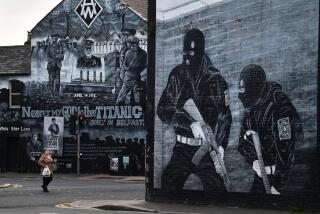Decaying Liverpool No Better Off Than During ’81 Riots : England: Spotlight shifts to disenchanted youths who joy ride in stolen cars.
- Share via
LIVERPOOL, England — Tensions run high in recession-hit Liverpool, the decayed northern English city widely recognized as a barometer of inner-city unrest.
Hometown of the Beatles and once one of the premier ports of the British Empire, Liverpool was the scene of riots 10 years ago by jobless youths in an earlier economic recession.
Recently, the spotlight was back on Liverpool when two children died after being struck by a stolen car in the run-down Toxteth neighborhood.
It was being driven by joy riders--youths who race stolen cars--a crime that has become widespread this year across the country. Sociologists view joy riding as the new way alienated young British males react to poverty and unemployment.
The tragedy embarrassed the Conservative government, forcing Home Secretary Kenneth Baker to pledge urgent action against joy riding.
Despite government-led attempts to regenerate Liverpool after the violent scenes of 1981, Toxteth is still derelict.
Expanses of wasteland remain where homes were burned down during the riots. Empty houses are shuttered with corrugated tin, broken glass litters the streets and mounds of uncollected rubbish fester in tattered black garbage bags.
More than half of the 18- to 20-year-olds in Toxteth, where there are many blacks, are unemployed, said Ken Roberts, a professor of sociology at Liverpool University.
“Things haven’t got better since the riots. In fact they’ve got worse,” said 69-year-old Jean Beaton, who has lived in the area all of her life.
Nearby, rain-spattered, drooping bouquets tied to a school railing marked where 12-year-old Adele Thompson was run over Oct. 30. Daniel Davies, age 9, also struck by the car, died in a hospital six days later.
Beaton said local youths joy ride because they have nothing else to do. Several youth clubs built after the 1981 riots have closed down because the City Council has no funds to run them.
In other British cities, police attempts to crack down on joy riding have led to violent clashes this year.
But Toxteth stayed quiet, partly because the close-knit community is wary of new destruction and police kept a low profile.
Police say they rarely enter the impoverished Granby Estate, an area of run-down 1960s City Council-owned houses where the 1981 riots and the Oct. 30 incident happened.
But local youths said the police frequently stop and question them. Residents say a threat of violence persists.
Many youths who took part in the 1981 riots are now parents. Today’s joy riders belong to a different generation with a blurred recollection of the trauma of 10 years ago, said Ray Sefia, who runs a community group set up after the 1981 riots to train local people for jobs.
Youths from this area are less likely to have jobs than other Liverpudlians, said Gillian Morris, a welfare worker.
She said an overstretched education service and the prejudices of local employers, who automatically reject applicants from Toxteth, add to the problem.
So, young people think they have little to lose by running the risk of jail.
More to Read
Sign up for Essential California
The most important California stories and recommendations in your inbox every morning.
You may occasionally receive promotional content from the Los Angeles Times.













